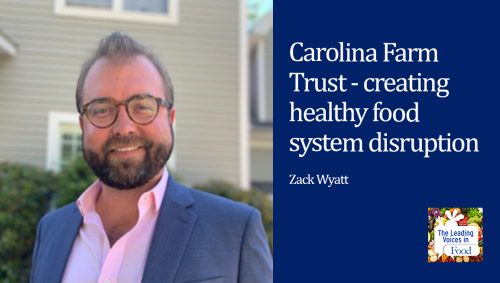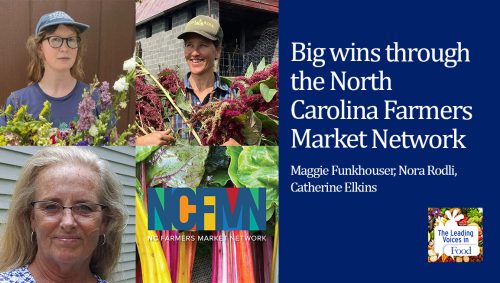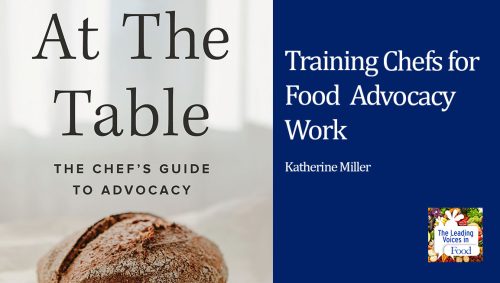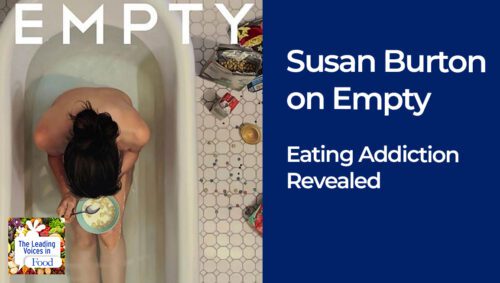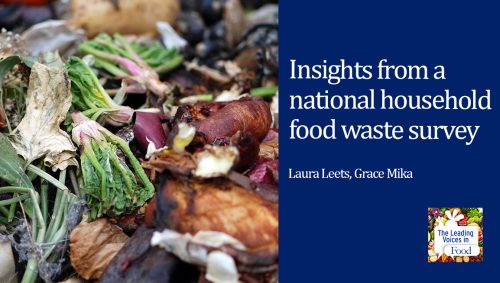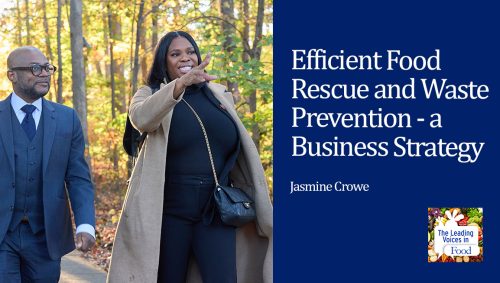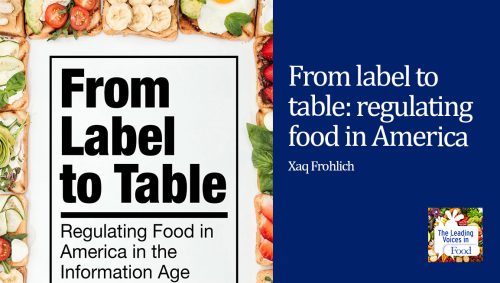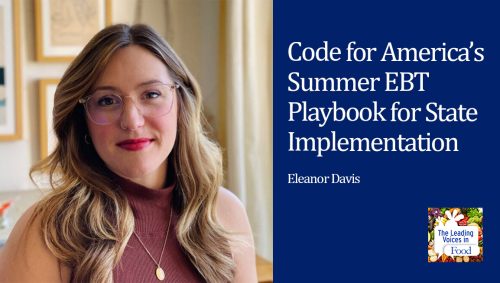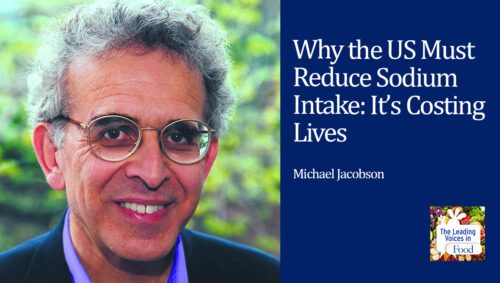The Leading Voices in Food
E76: Food Fights – A Civil Conversation About Contemporary Food Debates
Understanding our current food system, where it came from and especially where it might go is much easier if one understands history. Our field needs historians, thoughtful scholars who can do deep exploration of what has preceded the snapshot in time that represents what we’re experiencing today. This is why an exciting development was the recent publication of a book entitled Food Fights edited by two historians at North Carolina State University, Charles Ludington and Matthew Booker. We’re joined today by both of the editors.
Subscribe: Apple Podcasts | TuneIN | Google Podcasts | SoundCloud | PocketCasts | Radio Public
Tags: Agriculture & Tech | Chefs & Food Writers | Climate Change, Environment & Food | Food Policy | History & Food | Ultra-processed Food & Additives |

Charles Ludington is teaching associate professor in the department of history at North Carolina State University. He has taught and written about food history including the book entitled The Politics of Wine in Britain, The New Cultural History. Matthew Booker is associate professor of environmental history at North Carolina State University. He has written about oyster growers and oyster pirates…that would be interesting to talk about. This current book explores the rise and fall of aquaculture in American industrial cities.
Interview Summary
Guys, thanks very much for joining us. And let’s begin with the following question. Food Fights, your book, is described as a book that looks at food and food related debates through a historical lens. What does that mean, looking at things through a historical lens?
The basic idea is that we think that looking at the past of the current debates that we’re having, the origins of these debates, that helps us to understand a little more why we are here in the first place. For example, why it is we have the Farm Bill. So, looking at the past and the origins of the Farm Bill helps us to, I think, take some heat off the pressure of the debate and people blaming each other for this and that and neither side seeing things in wholly black and white terms. The idea is to take a variety of debates that we think are prominent in society, today and looking at their origins in order to understand why we’re here and hopefully by doing that we can move forward.
Yeah, just to pile on, I think Chad has really explained the point of the thing, which is that as historians, we always feel that there are roots and often invisible roots to the questions we debate in the present. Many of our current problems today are actually the results of solutions of yesteryear. Chad mentioned the Farm Bill, the origins of food subsidies in the United States. Food subsidies today are very unpopular on the extreme right and on the left of American politics, but those subsidies exist because in the 1930s the United States faced a real crisis for agriculture for farmers.
So, there are good historical reasons why we have those subsidies. They may no longer serve exactly the purposes they were originally intended for, but there are good historical reasons why they exist.
So Matthew, there are a lot of things historians could choose to look at. Why have folks decided to look at food as a way of looking at the history and vice versa?
We both, I think I’m speaking for Chad here, we both feel that food as something that occupies every human being on a daily level is an absolutely perfect way to get through and into the deepest questions we ask as people. In other words, food is a kind of repository for all of the hopes and dreams and fears of modern society. If you’re interested in policy for example of any kind, you can find some of our most interesting policy debates in the questions we ask about what shall we eat? Who should produce it? And under what conditions?
If you’re interested in the role of gender and class and race as we are as historians, all of those things are inherent in the way that we produce and consume food. And then, of course, our questions of the way we relate to the world around us, the environmental questions they’re all caught up in our food system, which is a major contributor to climate change and is also perhaps a path to a less carbon dense future.
Why did you decide to set the book up as a series of debates between leading scholars and food and agriculture?
That’s an excellent question. We wanted to do that because first of all, the book itself stems from a conference that we had at NC State, that Matthew and I organized at NC State. And in taking all these ideas, we realized we had a number of divergent opinions and that the best way to present these might be a series of debates in which the authors actually speak to each other, hopefully thereby providing an example of civil discourse. Not that scholars generally have a problem with that, but I would say in broader society that’s becoming more and more difficult.
By having these debates showing that there are multiple valid sides to these arguments, that it’s not necessarily black and white. In fact, it’s almost never black and white, we thought this format would be both engaging for the reader and also educational in as much as people would understand that these ideas are held very passionately by historians who spend a lot of time studying these issues and that we’re not going to simply solve the problem by declaring one side the victor and the other side evil.
We have to move forward with these debates. So, let’s go ahead and have a book that actually sets out these debates, not necessarily attacking each other’s points, but certainly pointing out strengths and weaknesses. And hopefully that way we can, over time, begin to build a consensus about how we might move forward.
Can you give us some examples of some of the topics covered in the book?
A woman named Margaret Mellon who is both a scientist and a lawyer by training, she writes about genetic modification or genetic engineering, as she prefers to call it, and suggests that it’s not delivered on almost all the promises that it made back in the 70s and 80s when it was really emerging as a field. At the same time, she doesn’t condemn it also, but says that there’s a place for genetically engineered food, but it’s not nearly as great as many in the food industry might claim that, nor is there an evil.
We move onto, from there, Peter Coclanis, a professor at UNC, goes on to defend Big Ag, as it’s called, saying that Big Ag has done wonders for the American economy. It’s a huge success story and that in the 19th century we envisioned a world in which agriculture was run as it is today. And we now produce huge amounts of food and the American family spends, broadly speaking, around 10% of their income on food, which is historically speaking a very, very low figure. And he suggests our system might not be perfect, but in many ways it’s done exactly what we as a society in the 19th century and the early 20th century wanted it to do and we should be very proud of that fact, despite the imperfections.
And then Steve Striffler (University of Massachusetts-Boston) who says, “Well wait a minute though, all of these things overlook workers. Our food system has the biggest problem and the fact that labor is so often overlooked.” So, that section on producing food really takes on some major, major arguments. Especially Steve’s argument is particularly interesting in my mind because he tackles the very food movement of which the book itself was a product, but he tackled it from the left basically saying that the big problem is the capitalist system itself and the way it treats workers. And none of the attempts at organic food, the organic food movement and food co-ops and all of this, none of these things will actually address the major problems, which is the way that the workers are treated, the way the animals are treated. Because most of our food movements are all consumer-based and we need to move away from that to worker-based or producer-based food movement.
So, right away we get into some very contentious debates. Choosing food, has number of articles about taste, and taste and social class, and nutrition and the way that nutrition changes very often. And Charlotte Biltekoff (University of California-Davis) argues there is that nutrition, in many ways, follows both the desires and the values of elites in society. And that’s why it often changes.
Matthew’s chapter is on food safety. My wife Sarah Ludington has written on food subsidies. And then section four is gendering food, babies and baby food and also on who cooks at home. And then finally cooking and eating food. Is it important to cook? The Michael Pollan, Mark Bittman on the one side as represented by Ken Albala (University of the Pacific) in his essay. And then Rachel Laudan (University of Texas-Austin) chimes in with a response saying, “Yeah, that’s a very romantic notion of the kitchen and of food and we need to move beyond that.”
So, Matthew, let me ask you this question. What are some of the key ideas in the book that address the issue of how we think of a healthy meal?
Throughout the book there’s a basic assumption and it’s inherent in the title that there are reasonable and thoughtful positions on most of the major debates. We wanted to present the best arguments for, for example, cheap processed food and the best arguments against cheap processed food. We wanted those to be there so that readers whom we imagine as undergraduates, as well as the broad public, could make up their own minds and have evidence to do it. So that they’re not operating from a set of opinions or just one side on the issue.
To get back to your question about the home cooked meal or about what is a good meal, our final essays are this wonderful back and forth between two extremely strong voices on the topic of the home cooked meal. The first is by Ken Abala, who is a food study scholar, widely published, a really interesting thoughtful person. His is called “A Plea for Culinary Luddism” and so he’s arguing that cooking food at home and cooking for others, in particular, gives us joy. It really is a way of connecting with other people. It’s an act of love and that we should all do it as much of it as we can. And that’s kind of his argument.
But it’s followed by Rachel Laudan, who’s a quite well known food studies scholar in her own right. She’s rewritten her famous essay actually in food studies. She’s retitled it “A Plea for Culinary Modernism: Why We Should Love Fast, Modern, Processed Food.” And Rachel Laudan points out that it is beautiful and wonderful to cook for others, but that much of the time that cooking is done by people who are overworked, who are underpaid and who are working a second shift or sometimes a third shift. And in other words, women. And that the modern fast processed food system has given American workers and American working class people and women in particular, this enormous gift of time. Sometimes time to be with their families. So, what does a good meal turns out to be a fairly rich question and one that is not simple. It’s not as simple as, we should all cook more at home.
A woman named Margo Finn at Michigan argues that it’s social class more than anything else that determines taste and that tastes changes over time precisely because when something becomes popular, say sushi, which might be a mark of distinction 15 years ago because it’s foreign, so it gives you social cachet. You travel, as it were, when you eat sushi. There was a time when sushi was consumed largely by wealthy Americans, but that as it’s become popularized, the elite move on to some other type of food in order to stay ahead of the game and she sees most of tastes as being a product of that.
She also argues that taste and what we eat is something that helps to position us in society and at a time in American society when there’s ever greater disparity in incomes, tastes and eating and food is something that has relatively low entry cost for consumers. So that those people with a great deal of cultural capital but not a great deal of financial capital can nevertheless place themselves fairly high up in society by eating organic foods and going to the farmer’s market and doing things that give them, again, a certain cultural cache.
So I come along in my essay and say that class is very much a part of taste and what determines what we think is best. But it’s not simply that food is gendered and so often make decisions based on how we want to define ourselves as men, as women or as non-binary. Because food itself has a gender that we give it. I talk about authenticity in the way that we often eat in order to be perceived as authentic and to think of ourselves as authentic. I write about taste for beer in America and on the one hand you have people who drink craft beer. Well, they might like craft beer, but part of it too is to say that, “I’m drinking a beer that has a history, this is the way beer used to be made. And so therefore, I myself am more authentic when I drink this craft beer.”
Well, of course, others come along and say, “I actually drink Bud Light because that’s a real beer. It’s none of this hoity-toity stuff. This is what gives me authenticity, is by drinking Bud Light.” Authenticity, gender, social class, ethnicity. All of these things come into play and help to determine what forms our taste. It’s quite complex, but it’s an ever-moving target also because, as you know, what we’re eating today probably won’t be what we’re eating five, 10 years from now.
I’d like to end with asking you each the following question. Then Matthew, why don’t we hear from you first. What were your favorite anecdotes or stories in the book or things that surprised you the most?
I especially loved essays by Sarah Ludington and Peter Coclanis, but those two especially appealed to me. And in Peter’s case, it’s the humor that he brought with him to the topic. He’s defending industrial agriculture, which is not frequently done, it isn’t. And if it is done in American popular writing or in academic writing for that matter, Peter’s case is very different. He’s defending industrial agriculture as an economist and historian. But his larger point is that this is a field, this is an industry, our first national industry, agriculture, that has driven almost all of our other industries. That innovation, for example, much of American innovation comes out of agriculture. And so, if you look at the patent office postings, filings from the 19th century, what you see is thousands and thousands of different innovations, patents for agricultural implements, but also bread slicers and apple corers. And so I think that’s the anecdote that sticks with me.
I’m a big fan of my wife’s essay, not simply because she is my wife, but because it’s a really wonderful history that hasn’t been written before. It’s a very straightforward history of the Farm Bill and food subsidies. And it really simplifies the story so that people can understand why the Farm Bill emerged, what it does today, and I think that that’s going to be a very important essay. As Matthew pointed out earlier, both on the right and left, there’s a lot of critiques of the Farm Bill and of food subsidies because, of course, the Farm Bill is not only about subsidizing farmers, roughly 80%. It’s about the SNAP program, what we used to call food stamps. That essay I think is really going to be very important the way that it just takes this issue on without a political agenda and helps to explain both sides.
I also really like Rachel Laudan’s postscript, because the essay that she wrote for is a reprint of a very famous essay that she wrote, I think, first back in 2001. This new postscript helps to describe what she thinks are the four different ways in which people think about food. She calls one the Aristocratic, the old European way of looking at it. Then there’s the Republican philosophy of food, which she says is broadly speaking, a lowercase “R” Republican. It is the American way of looking at food, which is food should be plentiful, and we should share it together, et cetera, et cetera. And then she goes on to talk about the Romantic conception of food and the Socialist conception of food. And in many ways, she’s absolutely right. When we think about ourselves as individuals and how we imagine cooking and eating and producing food, we almost all fall into one of these four categories. And so it really helps us get broader picture about both the past, but also the present.

